Certifications
Certainty in every detail
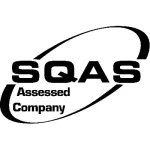
SQAS
SQAS (Safety and Quality Assessment System) in the corporate sphere it is a crucial factor of international guarantee regarding the quality of the logistic services provided in the chemical sector.
Iorio Trasporti e Logistica is among the only 15 companies in Italy to have received this certification.
The SQAS system was created in 1990 on the initiative of CEFIC – European Chemical Industry Council, as part of the Responsible Care programme, with the aim of improving the level of safety during the transport, storage and management of particularly risky substances such as chemical products.
It is an internationally recognized system for assessing the environmental, safety, security and quality performance of suppliers of logistics services to chemical companies, created with the aim of improving the level of safety during transport, storage and management of particularly noxious and dangerous substances such as the products of the chemical industry.
SQAS is also important for assessing the performance of a company in terms of the environment, safety and general quality of the logistics service provided in the chemical industry.
SQAS certification provides chemical companies with an objective assessment tool to use in the process of selecting logistics service providers.
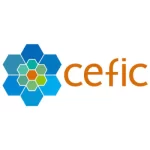
CEFIC
The European Chemical Industries Council or Cefic (from the French name Conseil Européen des Fédérations de l’Industrie Chimique), founded in 1959, is the largest trade association for the chemical industry.
The headquarters are in Brussels. Cefic represents 29,000 large, medium and small chemical companies in Europe by interacting on behalf of its members with institutions, non-governmental organizations and international media.
Chemical companies have a total of 1.2 million jobs in the European Union.
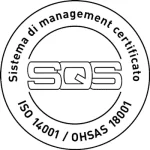
SQS - ISO 14001:2015
ISO 14001:2015 certification demonstrates to partners and customers that the organization adopts good practices to reduce the environmental impact of its processes.
ISO 14001 is the international standard for environmental management systems or EMS. ISO 14001 is the main standard that specifies the requirements for the formulation and maintenance of an environmental management system (EMS) and helps to implement sustainability, reduce impacts and ensure compliance with legislation on pollution and resource optimization .
ISO 14001 is the main reference standard for implementing a company policy that aims at the continuous improvement of environmental performance and management. The standard is, in fact, one of the tools for adhering to the ESG corporate social responsibility criteria which, increasingly adopted in corporate strategies, now play a key and essential role in the success of organizations.
The advantages of ISO 1400 certification
Caring for the environment and preventing businesses from causing negative impacts on the environment are two of the most important challenges businesses face today. One of the greatest advantages of implementing an environmental management system is the recognition that comes from being among those companies that are concerned with increasing their degree of sustainability. This can lead to better relationships with both partners and consumers.
Together with the good public image, the environmental management system, through the optimization of resources, can also bring savings and consequent economic improvements.
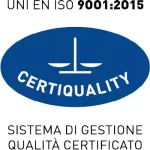
CQY Certiquality UNI EN ISO 9001:2015
Over the past few years, globalisation and the economic downturn along with an ever-changing and increasingly complex socio-economic context have called for a greater consolidation of the many management systems applicable to companies. This scenario has led to the need of issuing a new edition of the ISO 9001 standard, ISO 9001:2015.
The ISO 9001:2015 standard takes into consideration the entire system of needs and expectations of all interested parties (in terms of environmental protection, health and safety, social responsibility, energy management, privacy, etc.) within the specific business environment in which an organisation operates and which may contribute to enhance customer satisfaction.
Customer satisfaction, therefore, is directly related to that of the other interested parties (members of the community, company employees, etc.) and to having a socially responsible approach to the standard. To this end, the quality management system model has become more flexible in order to improve its interaction with other models and management techniques used by organisations in their activities. Since all management systems – regardless of their specific application – have the common purpose of eliminating or reducing the risks due to the variability and complexity of the relevant business environment, the new edition of ISO 9001: 2015 contains elements of risk management.
EcoVadis
EcoVadis aims to improve companies’ environmental and social practices by leveraging the influence of global supply chains.
EcoVadis operates the 1st collaborative platform that allows companies to monitor the Sustainability performance of their suppliers, across 150 industries and 110 countries.
EcoVadis’ reliable classifications and easy-to-use monitoring tools enable companies to manage risks and incorporate eco-innovations into their global supply chains.
The EcoVadis solution has already been selected by leading global multinationals to evaluate their global database of suppliers in more than 95 countries.

ESG certification:
Environmental, Social e Governance
ESG certification, i.e. the evaluation of a company’s Environmental, Social and Governance impact performance, represents an important added value in terms of enhancing the positioning and performance of a business.
Environmental, social, and corporate governance (ESG) is a set of aspects considered when investing in companies, that recommends taking environmental issues, social issues and corporate governance issues into account.
The term ESG was popularly used first in a 2004 report titled “Who Cares Wins”, which was a joint initiative of financial institutions at the invitation of UN. In less than 20 years, the ESG movement has grown from a corporate social responsibility initiative launched by the United Nations into a global phenomenon representing more than US$30 trillion in assets under management. In the year 2019 alone, capital totaling US$17.67 billion flowed into ESG-linked products, an almost 525 per cent increase from 2015, according to Morningstar, Inc. According to Morningstar, ESG investment funds in the United States saw capital inflows of $3.1 billion in 2022 while non-ESG investment funds saw capital outflows of $370 billion during the stock market decline that year.
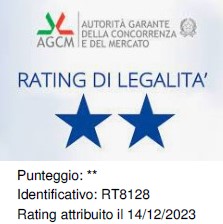
Legality Rating
Score: **
Identifier: RT8128
Rating assigned on 12/14/2023
Contact us
To receive more information or for a customized quote, contact us immediately by filling out the form on this page with all your data and you will be contacted as soon as possible by our staff.

